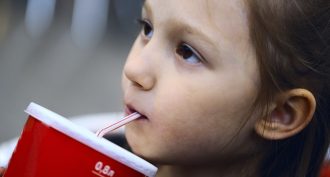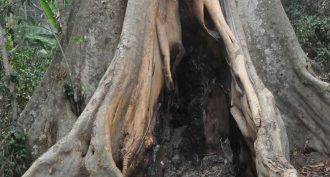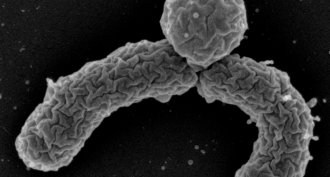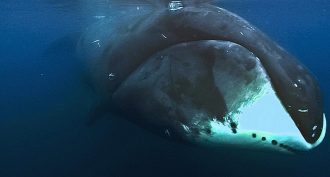Humans
-
 Health & Medicine
Health & MedicineSkip the soft drinks, period
Beyond the quest for trim waistlines and cavity-free teeth, girls have another reason to shun sodas and other sweetened drinks. These beverages may help launch the body’s menstrual cycles at an earlier age.
-
 Health & Medicine
Health & MedicineTeens exhibit a zeal to heal
Broadcom MASTERS is the premier middle school science and engineering competition. Several 2014 finalists showed a flair for biomedicine. These young researchers tackled everything from diagnosing cancer early to alerting drowsy drivers before they fall asleep at the wheel.
By Sid Perkins -
 Brain
BrainScreen time can mess with the body’s ‘clock’
Reading on an iPad in the evening can make it harder to fall asleep — and harder to wake up the next morning, a new study finds. The light from its screen tinkers with the body’s clock. And that could risk harming your health.
-
 Health & Medicine
Health & MedicineU.S. outbreak of measles emerges
The United States is experiencing an outbreak of measles. A traveler likely brought in the virus from abroad, which is now spreading. Most of those infected were never vaccinated and could now face serious health risks.
-
 Health & Medicine
Health & Medicine10 things to know about measles
Many people think that the measles vaccine wiped out the disease — at least in the United States. It hasn’t. And people who were never vaccinated face the primary risk of getting this very serious disease
-
 Science & Society
Science & SocietyMost students wrong on risks of smoking occasionally
Teens know that heavy smoking can seriously harm health. But most, a new study finds, don’t realize that smoking only now and then also is harmful. Data from a survey highlight teens’ mistaken ideas about the risks of intermittent smoking.
-
 Environment
EnvironmentImmunity: Environment can have big impact
A study on twins suggests that environmental factors can shape a person's immune system more than genes do.
-
 Brain
BrainA new ‘spin’ on concussions
Scientists have suspected that rotational forces in the brain may underlie concussions. A new study used athletic mouthguards containing sensors. Data on head movements during collisions suggest that a twisting of the brain may underlie mild brain injuries, including concussion.
-
 Microbes
MicrobesOngoing Ebola outbreak traced to hollow tree
Scientists suspect the current Ebola outbreak started with bats that lived in a hollow tree in Guinea. The outbreak's first victim, a two-year-old boy, often played in the tree.
-
 Health & Medicine
Health & MedicineNew germ fighter turns up in dirt
Scientists have found a compound in soil that can kill the microbes that cause anthrax, tuberculosis and other diseases.
-
 Environment
EnvironmentAir pollution can mess with our DNA
New research suggests a type of air pollution — diesel fumes — can affect your health. It inappropriately switches some genes on, while turning off others.
-
 Health & Medicine
Health & MedicineA whale of a lifespan
Bowhead whales can live more than 200 years. The secret to such longevity may lie in the Arctic species’ genes. Scientists recently mapped the whale’s genetic code. They found features that protect the marine mammal against cancer and other problems related to old age.